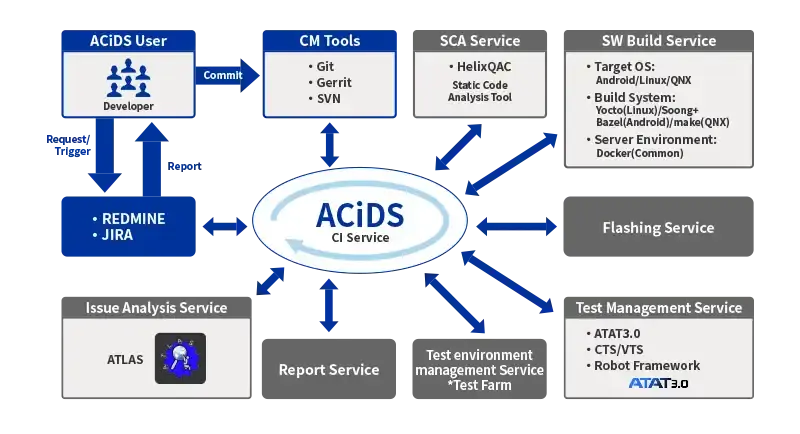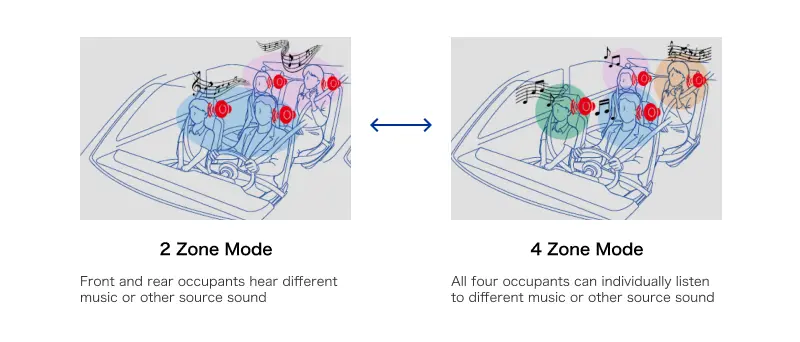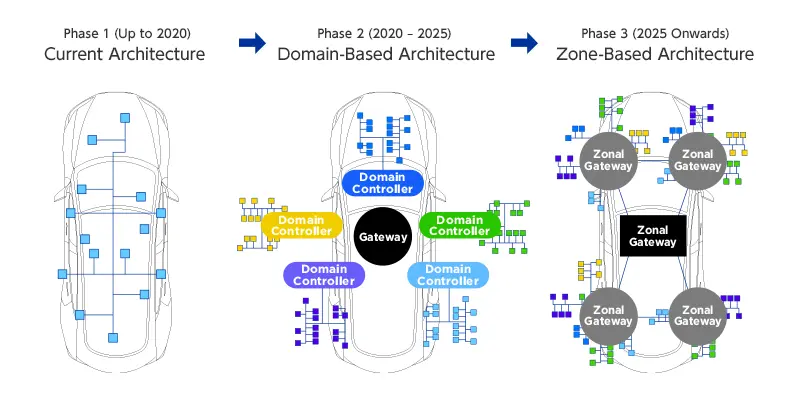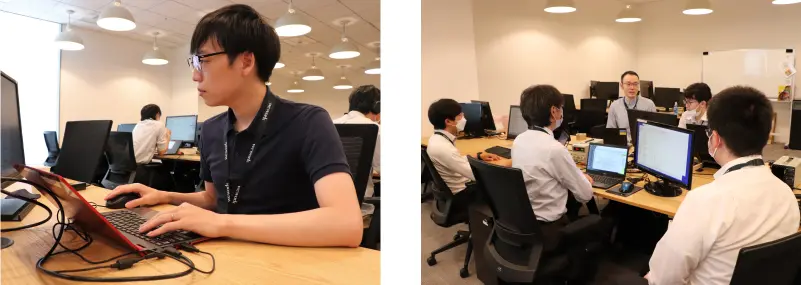Software Technology
Crafting New Experiences with Software Technology, Personalizing Comfort in the Mobility Space
Advances in automated driving and electrification hint at the gathering pace of the once-in-a-century major transformation underway in the world of automobiles and solutions are being sought to address the challenges of a new age. Harnessing expertise accumulated through extensive product development in the automotive domain, Alps Alpine is currently directing energy into software technology. Take a look at some of our most recent projects destined to contribute to a mobility-enriched future.

Alps Alpine Original Software Development
Taking stock of the current state and the future of mobility, we recognize the key role to be played by software technology. In April 2021, Alps Alpine opened its Software R&D Center in Sendai, Miyagi Prefecture, as an automotive software development base, seeking to satisfy demand for greater sophistication and complexity of software. The company is also actively recruiting fresh personnel as part of a comprehensive drive to strengthen operations. We have even adopted some of our own original methodologies based on expertise accumulated over the years for application to software development. We introduce two of them here.
Model-Based Test-Driven Development (MBTDD)
Alps Alpine’s unique Model-Based Test-Driven Development (MBTDD) is used to develop software for door module switches, capacitive sensors for steering wheels, air-conditioner control panels, sound system amps, displays, and other equipment. This method combines model-based development and test-driven development, and engineers design software visually by using a modeling tool on a computer. Scenarios for unit testing and a framework for implementing testing are created in the same way using models. Conversion from models to program code is done by the tool, so conventional hand-coding is unnecessary, and the time freed up can be devoted to model design. Program code, including testing, is executed automatically by computer, and this allows repeated evaluation at anytime, without human intervention. The creative part is done by people, while routine work is done by the computer, and this enables both improved development efficiency and improved quality.

Alps Alpine Continuous Integration and Deployment Suite (ACiDS)
For large-scale software with programs running to more than 10 million lines of code, we generally use open-source development. But because changes are made on a daily basis, it is hard for us to stay in control of it alone. ACiDS is used for that kind of development. ACiDS is an original Alps Alpine methodology that combines continuous integration and deployment (CI/CD) approaches with our Alps Alpine Test Automation Tool (ATAT). During phases when few changes are made to programs, software is generated automatically and evaluated using analytical tools. After checking the changes for faults, the software is assembled. It is then written to actual equipment and undergoes automated testing. Developers will be notified of any problems. ACiDS is a tool for automatically linking this series of processes together.
ACiDS shortens development time, improves work efficiency and ensures a certain level of quality. Alps Alpine is good at pulling everything together using Android™1 and Linux open-source platforms and also has an advantage in having met the stringent requirements of automakers in numerous development projects. The company has had success employing ACiDS in the development of software for products such as car navigation and in-vehicle infotainment systems.
1. Android is a trademark of Google LLC.

Contributing to Smart Factories with Software
Software is applied to not only products, but also helps to enhance production technology employed in the manufacturing process. Alps Alpine makes use of real-time visualization systems, maintenance log management integration applications for digitalization of equipment that is likely to become dependent on individuals, and AI optical character recognition (AI-OCR) combining deep learning technology and image processing technology. In addition, we are pursuing automation of visual inspections through the use of machine vision and artificial intelligence (AI). These activities are supported by software, which is therefore essential for promoting smart factories.
Extensive Automotive Product Experience
For over 40 years, Alps Alpine has engaged in the development and manufacture of a large number of automotive products. We continue to deploy a diverse lineup, including components such as switches, sensors and communication modules; modules for power window switches and electronic shifters; multiple award-winning car navigation systems; and sound systems and rear seat monitors for emotion-eliciting mobility spaces.
As a recent product case example, Alps Alpine jointly developed a capacitive display panel with TOKAI RIKA Co., Ltd. The capacitive display panel is a next-generation human-machine interface (HMI) product enabling smart, intuitive control through hovering and gesture operation and vibrational feedback. Through these activities, Alps Alpine has contributed to comfort and peace of mind within automotive lifestyles and we have accumulated software expertise.

| Car Navigation Systems | A diverse lineup that includes Display Audio products |
|---|---|
| Power Window Switches | As global leader in terms of output, our products are used worldwide in a wide range of vehicles |
| Lift Up 3-Way Speakers | Speakers delivering clear, luxurious sound |
| Rear View Camera Safety Systems | Assists driving safety by conveying the situation at the rear of the vehicle |
Other Products
| Drive Recorders | Keeping watch over car activity and safety while driving or parked |
|---|---|
| See-through E-Mirrors | Display camera images for a clear rear view at all times |
| Premium Sound Speakers | Creation of acoustic spaces that elicit emotion with outstanding sound and design |
| Rear Seat Monitors | Enhancing entertainment for rear seat passengers with high-definition images |
| HVAC Control Panels | Supporting comfort inside the vehicle cabin with superior operability |
| Tailgate Kick Sensors | Realize automatic tailgate opening and closing with detection of foot movements |
Quick Action on New Mobility Challenges
Staying attuned to the needs of an automotive industry currently going through a major transformation that is gathering pace, Alps Alpine is contributing to the future of mobility by advancing fresh initiatives using software and other technology. Here we introduce some of the initiatives we advance to address issues within CASE and software-defined vehicle (SDV) domains and to ensure higher levels of comfort, quality and safety in the mobility experience.
CASE
Connected Cars
For the connected car domain, where vehicles are incorporated into an Internet of Things, we deploy 5G communication modules. Alps Alpine was the first Japanese corporation to develop a 5G NR module for automotive use with C-V2X features. Shipping of samples began in March 2021. We are also working toward introducing to the market in the near future other technologies, such as a fusion of 5G with vehicle-to-vehicle (V2V) and vehicle-to-infrastructure (V2I) technology, and technology enabling 50cm positioning accuracy looking ahead to an age of fully autonomous vehicles.
Autonomous Driving
In this domain, we are pursuing the area of cabin monitoring. These solutions make use of cameras and sensors to monitor the driver and passengers from the moment they board the vehicle to enhance their safety and comfort both while driving normally or when operating in autonomous mode. Realization of fully autonomous driving will also have a big influence on what people do during their journey. Our system of Personal Sound Zones separates front and rear seat areas into two zones, or driver’s seat, front passenger seat, and left and right rear seats into four zones, to create different sound spaces. Each person gets to enjoy the entertainment of their choice without noise from other seats interfering. For example, the driver could be watching a sports game while the front passenger takes in a movie and rear passengers play video games.

Sharing and Services
This is the domain where we bring to life new mobility-as-a-service (MaaS) offerings, such as our digital key system useful for car sharing and corporate fleet management. The system makes it possible to lock and unlock doors, start the engine and manage vehicles efficiently using smartphones in place of car keys. Implemented under high safety standards, there are benefits for both users and business operators. Alps Alpine has also teamed up with Giesecke+Devrient, a global company headquartered in Germany, to develop a wireless digital key system compliant with a standardized global specification, with a view toward inclusion in new vehicle models for 2025.
Electrification
Development and expansion of electric vehicle lineups have progressed worldwide as new participants enter the market from other industries. In response to this trend, Alps Alpine has developed an acoustic vehicle alerting system (AVAS), a technology now mandated for electric and hybrid vehicles. Incorporating expertise built up through involvement with audio products, the system generates a natural and optimal sound matching the specific characteristics of the particular vehicle model. For electric vehicles, which have no engine, road noise cancellation technology cancels out noise caused by vibrations from contact with the road surface while driving, realizing a quiet, comfortable mobility environment where occupants can savor the entertainment.
Software-Defined Vehicles
Another key term hinting at the future of mobility is “software-defined vehicle (SDV).” This concept for the near future entails the use of software to realize a large number of automobile functions. Like smartphones and PCs, the hardware in cars is going to become increasingly uniform and standardized and software will be a way of differentiating vehicle character and performance. We are headed for an age where software will determine functions inside the vehicle cabin and various autonomous driving features, as well as electric vehicle output and acceleration.
Today’s cars carry between 100 and 200 electronic control units (ECUs) for controlling each of the vehicle’s electronic systems. To overcome the structural complexities, automakers are exploring ways to integrate ECUs. They are looking at domain- and zone-based architectures.
One original solution Alps Alpine is working on in response to these developments is the Cabin Controller system. As the name suggests, the system is the core of the digital cabin. It takes on integrated control of available functions and enables addition or upgrading of functions even after the vehicle is sold by updating the software. It is indeed a solution reflecting SDV and ECU integration trends.

Using Software to Create Value for the Future – A Shift from Physical Items to Services
Besides monozukuri, or the crafting of high-quality products, Alps Alpine also directs energy into kotozukuri, presenting to customers new systems and services. It is a solutions business spanning diverse fields and includes, in anticipation of the “year 2024 problem,” a logistics solution featuring an onboard digital key system, as well as a worker monitoring solution for lowering the risk of occupational accidents in manufacturing environments.
In configuring those new solutions, software foundations and human resources will be of paramount importance. Alps Alpine supports the upskilling of software engineers and data analysts through a structured training program that extends from basic to practical training. In the case of software engineers in the mobility domain, they have opportunities to engage in cutting-edge development alongside engineers of other companies, including premium automobile manufacturers in Germany. People all over the world are gaining access to new value and new experiences because of software. With that in mind, Alps Alpine will continue to refine its technology further.
